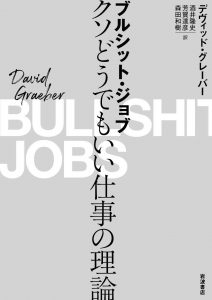This past September, cultural anthropologist and activist David Graeber passed away unexpectedly. Many readers may remember his book, “Bullshit Jobs: A Theory,” which was published in Japanese this past July and generated buzz as a must-read book.
Why should we read this book now, and what is it trying to tell us? In this article, Satoshi Kizawa, theorist and author of “Nick Land and Neo-Reactionaries: The Dark Thought in the Modern World” and more, uses the music of Oneohtrix Point Never and the ideas of Mark Fisher to decipher “Bullshit Jobs,” a book packed full of insights to help us think about what comes next in these difficult times.

Listening to Oneohtrix Point Never’s “Love in the Time of Lexapro”
Someone once said, “It is easier to imagine an end to the world than an end to capitalism.” In response, a critic added, “It is easier to imagine an end to the world than an end to capitalism because capitalism is the end of the world.”
What kind of music is the soundtrack to the end of the world, or the end of the world late capitalism has created? What kind of music is most fitting for these end times that is our reality?
Currently, I’m listening to Oneohtrix Point Never’s “Love in the Time of Lexapro” on iTunes, and on repeat, as I type away on my MacBook butterfly keyboard. “Love in the Time of Lexapro.” Lexapro, also known as escitalopram oxalate, is a type of antidepressant called a selective serotonin reuptake inhibitor (SSRI), originally developed by the Danish company Lundbeck. SSRIs increase levels of the neurotransmitter, serotonin, in the brain by blocking its reabsorption by nerve cells. Serotonin is often referred to as the brain chemical responsible for love. So, we discover what love is by taking our psychiatrist-prescribed Lexapro. That is love in the time of Lexapro, the shape that love has taken in these end times. And I have learned that ultimately, love is the energy to get out of bed in the morning, the stamina to throw out every single piece of accumulated trash into the appropriate trash can, and the readiness to bathe about once every three days. I also learned that the light bitterness of the Indian generic of Lexapro on the tongue, is the true source of love. But Lexapro couldn’t shake me of that empty feeling, the reality that my feelings of love and happiness were the mere result of chemical actions caused by neurotransmitters in my brain.
In “Capitalist Realism”, Mark Fisher explains why depression is on the rise
Mark Fisher, the author of “Capitalist Realism” who took his own life in 2017, warns us against the prominent thought of our time. In his book, he talks about how in modern society, the social causes of depression are neglected. Instead, depression is naively reduced to chemical imbalances in the brain. In this framework, mental illnesses such as depression are stigmatized as the individual’s responsibility to resolve, and as a result, individuals are sucked into a vicious cycle of further marginalization and isolation. While it is not impossible to accept that depression is caused by low serotonin levels, there must be an explanation for why certain individuals have low serotonin levels. It is not unreasonable to assume that societal factors such as work environments and poverty may play a role.

According to Fisher, the rise in depression is clearly linked to the modern state of work. He calls this phenomenon “new bureaucracy,” explaining that under the neoliberal governments of modern capitalism, the formalities associated with bureaucracy have actually been increasing (this is exactly what David Graeber, who we discuss later, refers to as “Bullshit Jobs”). In modern society, a new type of managerial bureaucracy of “aims and objectives,” “outcomes” and “mission statements” has proliferated.
“What we have is not a direct comparison of workers’ performance or output, but a comparison between the audited representation of that performance and output. Inevitably, a short-circuiting occurs, and work becomes geared towards the generation and massaging of representations rather than to the official goals of the work itself.”
Formal auditing and self-assessment systems force workers to harm themselves through self-criticism. In a system of constant monitoring and cumbersome, empty paperwork required in anticipation of an audit, individuals eventually fall into an inevitable cycle of inefficiency.
David Graber questions the need for productivity
In his book “Bullshit Jobs: A Theory,” anthropologist David Graeber cites a British public opinion poll. In response to the question, “Is your job making a meaningful contribution to the world?” a surprisingly large third (37%) of respondents answered that they believed it did not. Indeed, many workers are aware that their work is meaningless, and yet, they are still forced to work.
Graeber gives the following definition of the term “bullshit job,” a phrase which he himself coined. “A bullshit job is a form of paid employment that is so completely pointless, unnecessary, or pernicious that even the employee cannot justify its existence even though, as part of the conditions of employment, the employee feels obliged to pretend that this is not the case.”

The word “bullshit” is used to describe something disliked or unnecessary, but it can also mean a lie or nonsense. So, a bullshit job, like its name, is a job that is not only unnecessary, but also painted over with deception and nonsense.
Sadism and obedience between superiors and subordinates. The vast, meaningless paperwork produced for the sole purpose of keeping up with appearances. The bloated bureaucratic administration that is protected by bullshit jobs. In this world, work that is truly essential is disregarded and only bullshit jobs, which everyone is aware are meaningless, continue to proliferate. This is how modern capitalism operates in the time of Lexapro.
How did we get here? Why aren’t bullshit jobs decreasing? There are many possible reasons, but one reason Graeber suggests is the (perhaps misguided) tendency for humans to think that labor is a virtue. Of course, this has not always been the case. In ancient Greece, labor was considered to be detestable, and something to be avoided as much as possible. It was only with the birth of Christianity in the West that labor became a punishment for the original sin, and even began to take on a sacred value. Under this belief (according to the Bible’s account), productivity became a religious command. God commanded men to till the soil and women to bear the children. From all of this arises the notion of arduous labor, labor carried out to repay a debt to God, and labor as a noble duty. And on the other hand, people who do not work are condemned as lazy and unethical. Work is a voluntary penance, and at the same time both punishment and atonement.
It should be said that there is no basis, other than a religious one, for the idea that labor is inevitable and impossible to eliminate. At the very least, eliminating arduous labor, or the bullshit jobs, could be sufficiently possible at this very moment. Graeber, for example, makes a case for a universal basic income.
Under capitalism, idleness has been cast as an enemy to justify the pain of productivity. But idleness is the only work that can resist work. To be purely unproductive is a revolutionary act in and of itself.
Translation Aya Apton
